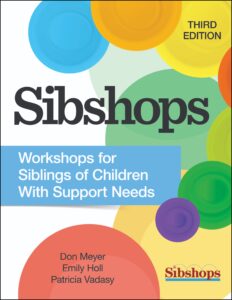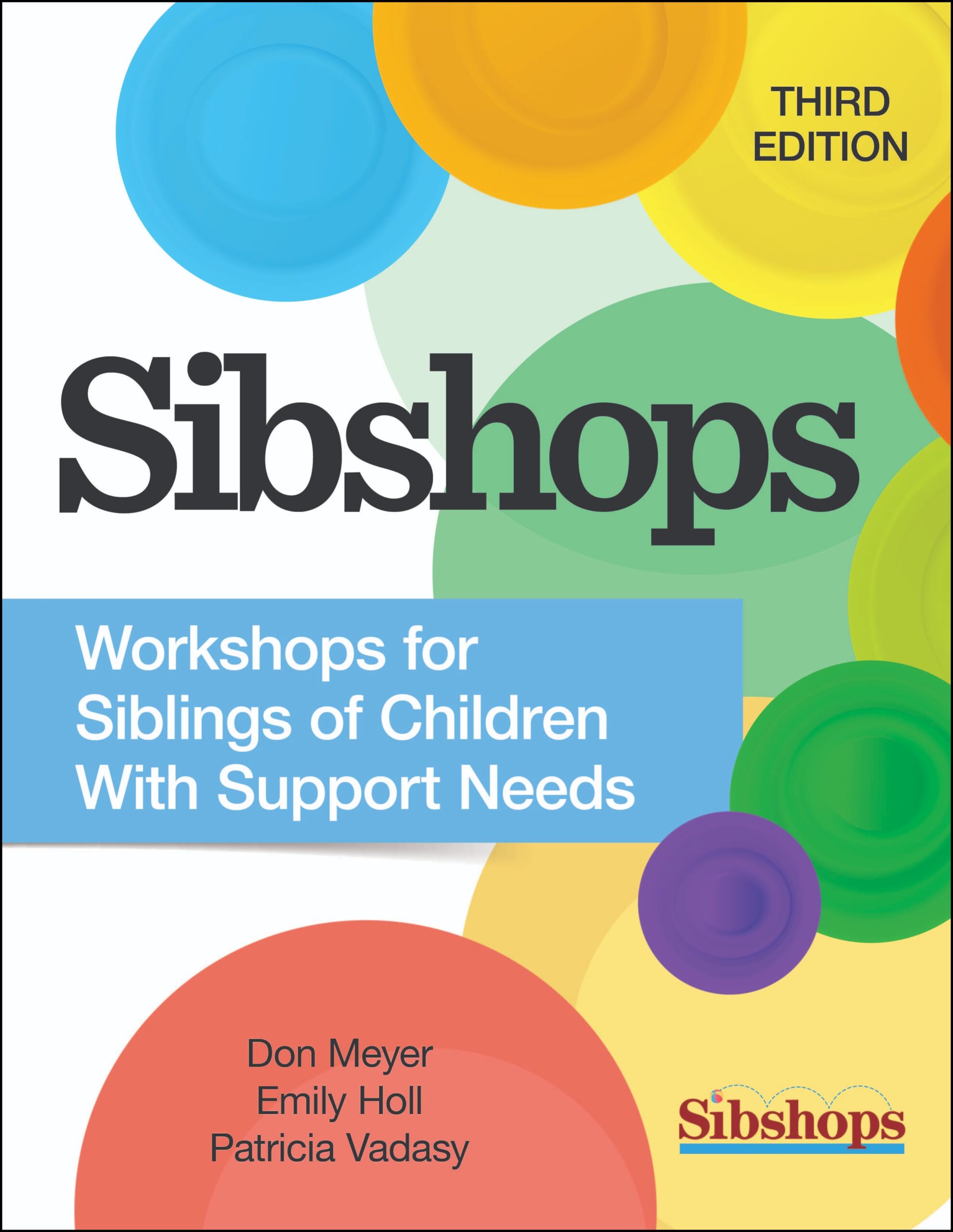10 Things Families Can Do to Support Siblings of Children with Disabilities
December 12, 2023
Siblings of children who have health, developmental, and mental health concerns play important roles in the lives of their brothers and sisters. But sometimes, the unique challenges, emotions, and needs of siblings can be unintentionally overlooked.

In today’s post, adapted from the new edition of Sibshops by Don Meyer, Emily Holl, and Patricia Vadasy, discover 10 things parents of children with support needs should do to acknowledge and address the needs of typically developing siblings. (These suggestions originated from a discussion in the online community of the Sibling Support Project.)
Acknowledge siblings’ emotions
Like parents, brothers and sisters will experience a wide array of often ambivalent emotions regarding the effect of their siblings’ support needs on them and the family as a whole. These feelings should be both expected and acknowledged by parents and other family members. Because most siblings will have the longest-lasting relationship with the family member who has a disability, these concerns will change over time. Parents (and the providers who work with them) should stay in touch with siblings’ lifelong and ever-changing emotions and concerns.
Address siblings’ concerns about the future
Early in life, many brothers and sisters worry about what obligations they will have toward their sibling in the years to come. Parents can reassure their typically developing children by:
- Making plans for the future of their children with support needs
- Listening to siblings’ ideas, concerns, questions, and suggestions as they make these plans
- Considering backup plans
- Realizing that their typically developing children’s availability may change over time
When siblings are given the message early that they have their parents’ support to live their own lives and pursue their own dreams, their future involvement with their sibling who has a disability will become a choice instead of an obligation. For their own good and for the good of their siblings with disabilities, brothers and sisters should be afforded the right to their own lives.
 Carve out one-on-one time with siblings
Carve out one-on-one time with siblings
Children need to know from their parents’ deeds and words that their parents care about them as individuals. When parents carve time out of a busy schedule to take a walk or hike, grab a bite at a local burger joint, or window shop at the mall with their typically developing children, it conveys a message that parents are there for them and provides an excellent opportunity to talk about a wide range of topics. You might consider exchanging notes in a journal together, or transforming routine errands such as grocery shopping into special one-on-one time for parents and siblings. Set aside a few minutes after the child with a disability goes to bed—this can be a great chance to spend extra time with siblings.
Prioritize good communication and active listening
Although good communication between parents and children is always important, it’s especially important in families where there is a child who has support needs. Consider taking an evening course in active listening to help improve communication among all family members. Read books such as How to Talk So Kids Will Listen and Listen So Kids Will Talk (2012) and Siblings without Rivalry (2012) (both by Adele Faber and Elaine Mazlish), which provide helpful tips on communicating with children.
Have similarly high expectations for all siblings
To the extent possible, have the same expectations for your children with and without support needs regarding chores and personal responsibility. Not only will similar expectations foster independence, they will also minimize the resentment expressed by siblings when there are two sets of rules—one for them and another for their sibs who have support needs.
Some typically developing brothers and sisters react to their sibling’s disability by setting unrealistically high expectations for themselves. Some feel that they must somehow compensate for their sibling’s support needs. Parents can help their typically developing children by conveying clear expectations and unconditional support.
Expect typical sibling conflict
Teasing, name-calling, arguing, and other forms of conflict are common among most brothers and sisters—even when one has special needs. Although parents may be appalled at siblings’ harshness toward one another, much of this conflict can be a beneficial part of typical social development.
Regardless of how developmentally appropriate it might be, sibling conflict is more likely to result in feelings of guilt when one sibling has health or developmental needs. When conflict arises, the message sent to many brothers and sisters is, “Leave your sibling alone. You are bigger, you are stronger, you should know better. It is your job to compromise.” Remember that typically developing siblings deserve a life where they, like other children, sometimes misbehave, get angry, and fight with their siblings.
Celebrate every child’s achievements and milestones
Over the years, the authors of Sibshops have met siblings whose parents did not attend their high school graduation—even when their children were valedictorians—because the parents were unable to leave their child with support needs. They have also met siblings whose wedding plans were dictated by the needs of their sibling with a disability. One child’s support needs should not overshadow another child’s achievements and milestones. Seek out respite resources and creative solutions and strive for flexibility to ensure that the accomplishments of all family members are celebrated.
Make safety and security a priority
Some siblings live with brothers and sisters who have challenging behaviors. Other siblings assume responsibilities for themselves and their siblings that go beyond their age level and place all parties in vulnerable situations. Siblings deserve to have their own personal safety given as much importance as the family member with support needs.
 Invite siblings to planning meetings
Invite siblings to planning meetings
Consider inviting (but not requiring) siblings to attend planning meetings at every stage of transition in the life of the person with a disability, including informational, IEP, and transition planning meetings. Siblings frequently have legitimate questions that service providers can answer. Brothers and sisters also have informed opinions and unique perspectives on the abilities and strengths of their siblings with disabilities and can make positive contributions to the child’s team.
Connect with a local support program for siblings
Like their parents, siblings benefit from talking with others who “get it.” Look for a local support group for siblings, or take steps to establish one in your own community.
The Sibshops model is one popular approach to offering peer support to siblings of children with disabilities. Widely used for more than 40 years in hundreds of communities worldwide, Sibshops are lively, low-cost workshops where siblings can share their joys and challenges, learn from their peers, and just have fun together. The new third edition of the Sibshops guidebook (linked below) walks readers through the process of creating and launching a Sibshop for siblings ages 8 through 17.
***
Use these 10 tips to meet the evolving needs of siblings of children with support needs—and if you’re in a position to help launch a local support group, be sure to check out the new book behind today’s post!








Write a Comment
Your email address will not be published. Required fields are marked *
Post a Comment